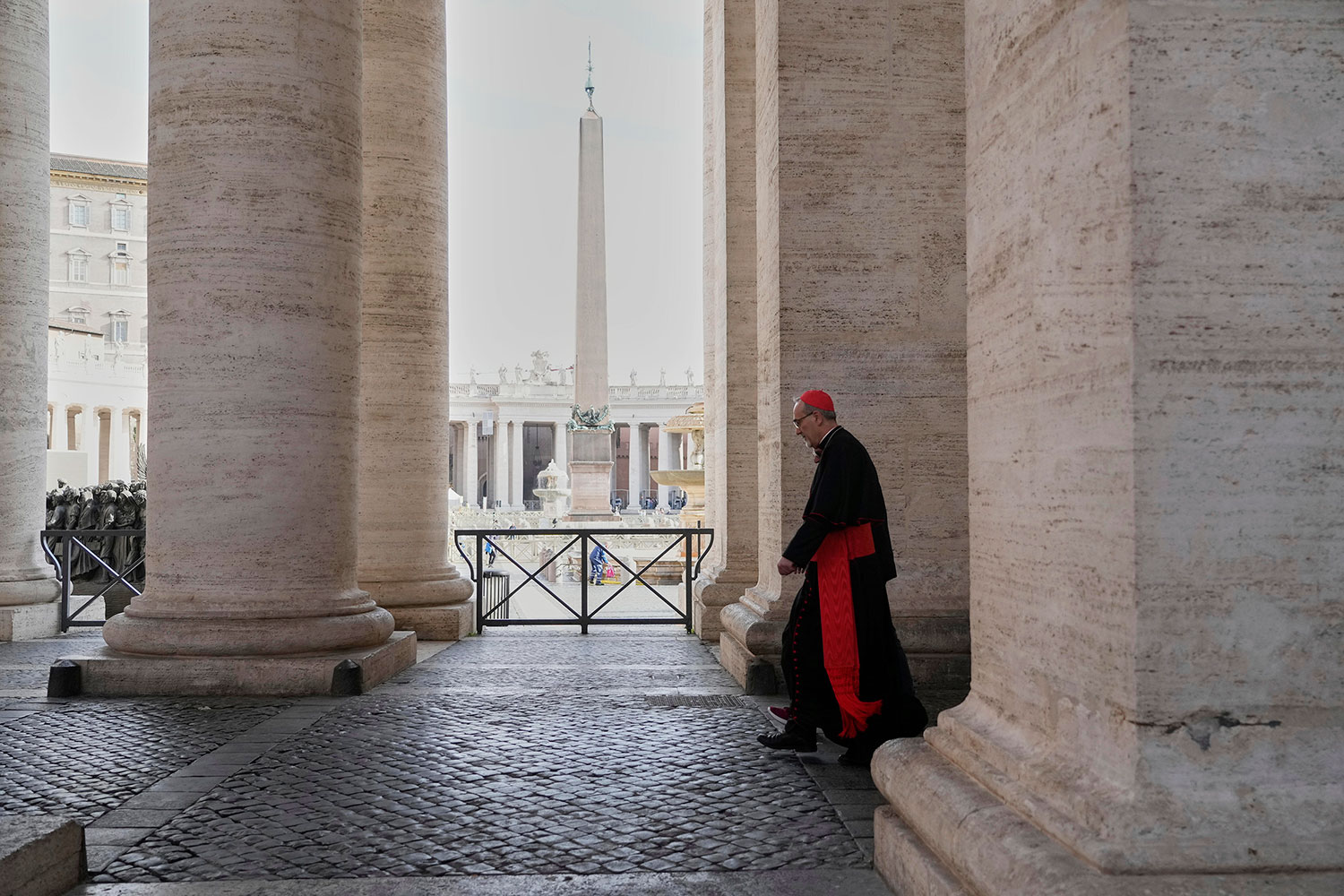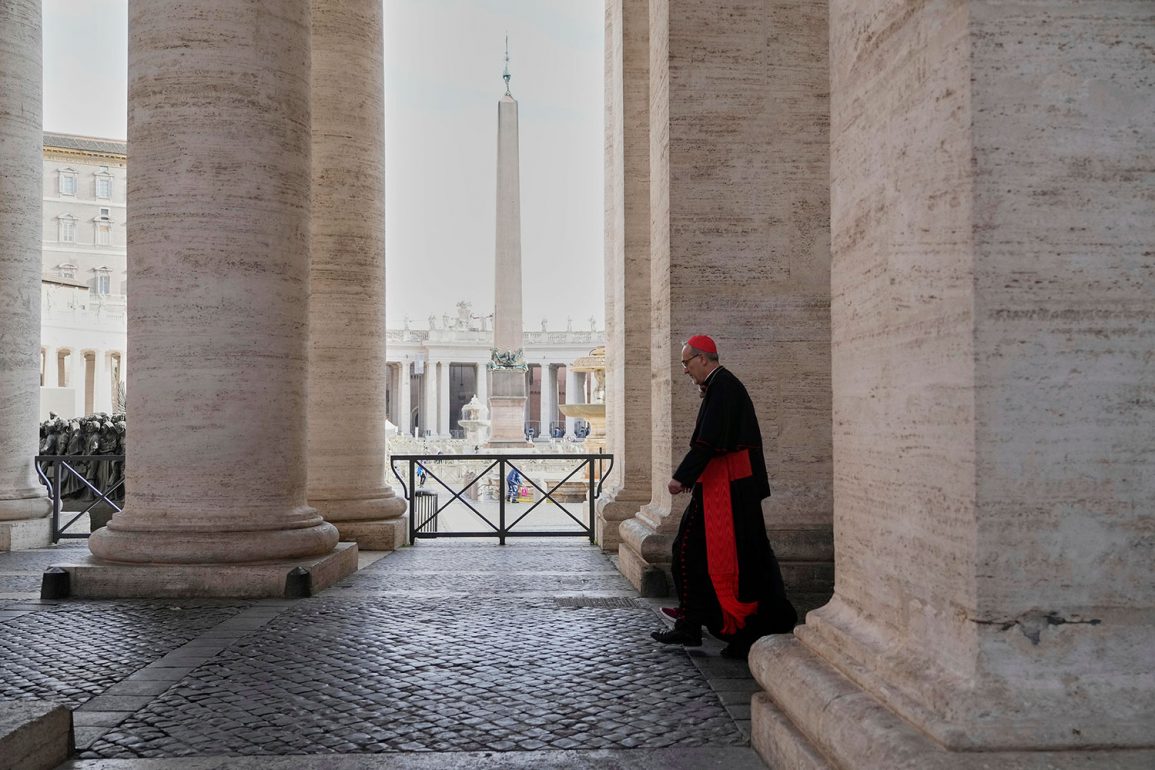
VATICAN CITY (RNS) — Before his death on April 21, Pope Francis made it a habit to call the 500 people taking shelter in the Holy Family Church, a Catholic parish in Gaza City, every evening to ask about how they and their supplies were holding up.
In early June, the church was briefly left without means to contact the outside world, after Israeli airstrikes destroyed telecommunications structures in the area. Now, to speak to their bishop, Latin Patriarchate of Jerusalem Cardinal Pierbattista Pizzaballa, Holy Family’s priests must climb on the roof to search for a cell signal using eSim chips, according to Catholic charity workers in Gaza.
The emergency clinic at the parish also had to suspend its operations for a time. “Even their food is depleting over there,” said Anton Asfar, secretary general of the Catholic charity network Caritas Jerusalem, in a phone call with Religion News Service.
“There is no secure place, there is no safe place, and communities are squeezed,” he said.
Caritas Jerusalem has 10 medical points in Gaza, though one, located in a “hot area,” Asfar said, had been shut down. The 122 Caritas members are offering aid on the ground in Gaza with the help of local volunteers who have continued their work despite the risks of operating in a war zone.
When Israel began its attack against Iran June 13, and after Iran’s retaliation, Caritas could not guarantee the safety of its workers, Asfar said, leading the charity to temporarily suspend all operations in the West Bank and Gaza.
“But our staff, we have wonderful staff, our very loyal mission operators, they were stubborn. They wanted to provide lifesaving services to the needy,” Asfar said, and they soon resumed work. Preparing for the worst, they are carrying out drills in case of bombings and readying bunkers, he added.
In October, a 26-year-old Caritas staffer died with her husband and infant daughter during an airstrike on the St. Porphyrios Church, a Greek Orthodox Church in Gaza, which was providing shelter for roughly 500 people. An estimated 17 people died in the attack.
Caritas Jerusalem works in close partnership with the Latin Patriarchate of Jerusalem and a cluster of aid agencies. The aid corridor launched by Jordan to provide necessary medical supplies is no longer able to reach people in Gaza, Asfar said.
The Catholic charity also does not collaborate with the Gaza Humanitarian Foundation, established by Israel and registered in Geneva and Delaware, Asfar said. “This is not aid,” he said, referring to the foundation, which has come under scrutiny for its lack of financial transparency. Asfar criticized the foundation’s decision to hire a security company, Safe Reach Solutions, to oversee aid distribution, saying aid organizations should not use weapons.
Dozens of Palestinians have been killed and many more were wounded by Israeli Defense Forces as they attempted to receive aid near a distribution site run by GHF, according to media reports. (GHF has denied that any shooting occurred near its site.) Asfar said that the GHF is “a really undefined way of supplying people with food.”
But Asfar also said that Gaza has seen growing numbers of Palestinian armed gangs and said that “it’s becoming extremely dangerous” to bring aid to the region as the rule of law continues to break down.
Just before he died, Francis donated a popemobile he used in a visit to Caritas in the West Bank in 2014, asking that it be repurposed as a mobile health clinic for Gaza. The popemobile is ready for deployment, Asfar said, but Caritas is still waiting for permits from Israel to enter Gaza.
Asfar said that “humanitarian conditions have really deteriorated” as well in the West Bank, where, he said, Caritas is the only charity organization still operating. He reported that Israel has built more fences and gates there, making it difficult for his group to bring aid from Jerusalem. He said the hospitals in the West Bank city of Jenin, where the refugee camp there is under Israeli military control, lack basic supplies.
Asfar said that residents in the West Bank are often ordered to leave their homes, “and they leave everything behind and are left with nothing.” Caritas is active in providing basic care and food for those who have lost any means of living.
The deprivation, he said, has not diminished residents’ faith and hope for the future. “We believe in the power of prayer. We feel it over here, and it provides us with a lot of hope and energizes us to continue our mission in the Holy Land,” he said.
He appealed to the world leaders to bring “a true end” to the conflict and pointed to the newly elected Pope Leo XIV as “a man of peace” who is concerned about the situation and close to the people suffering in the Holy Land.








